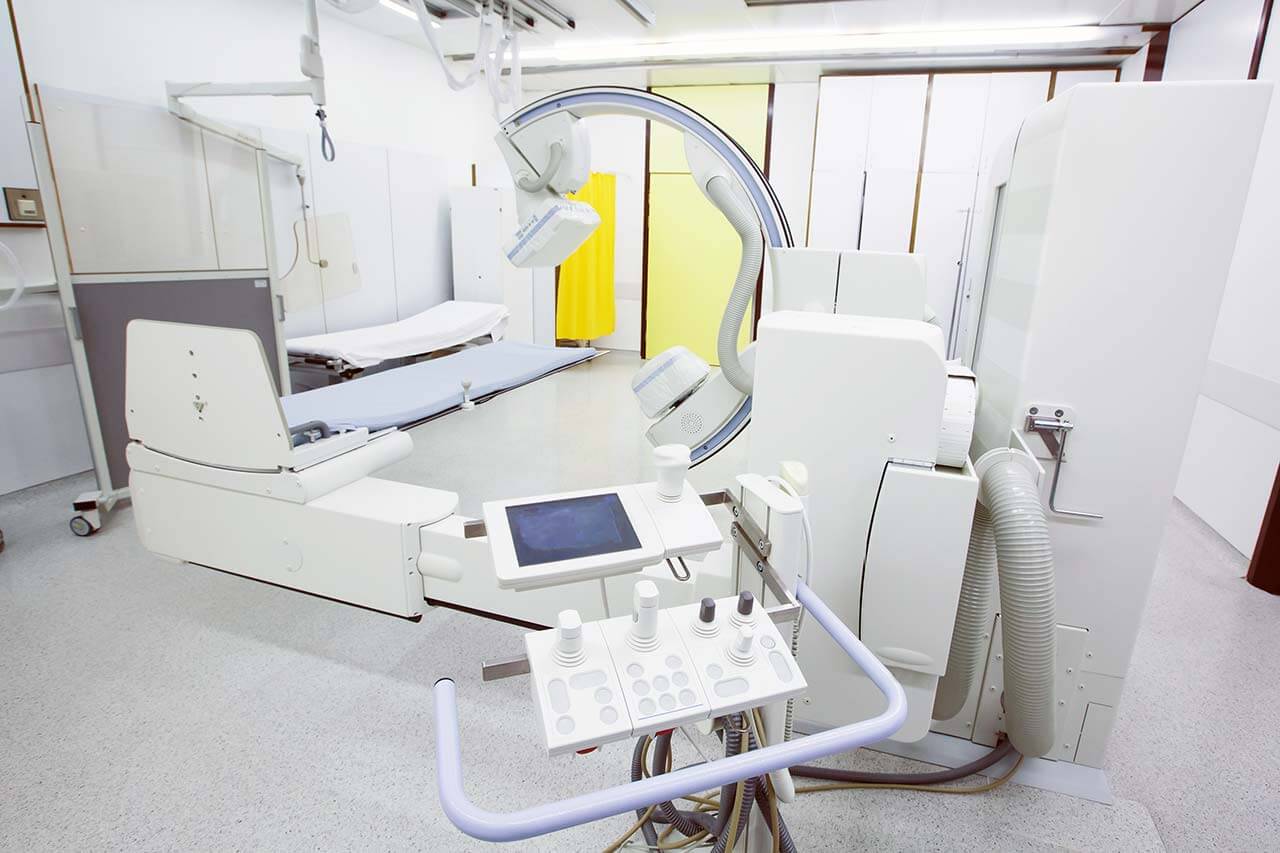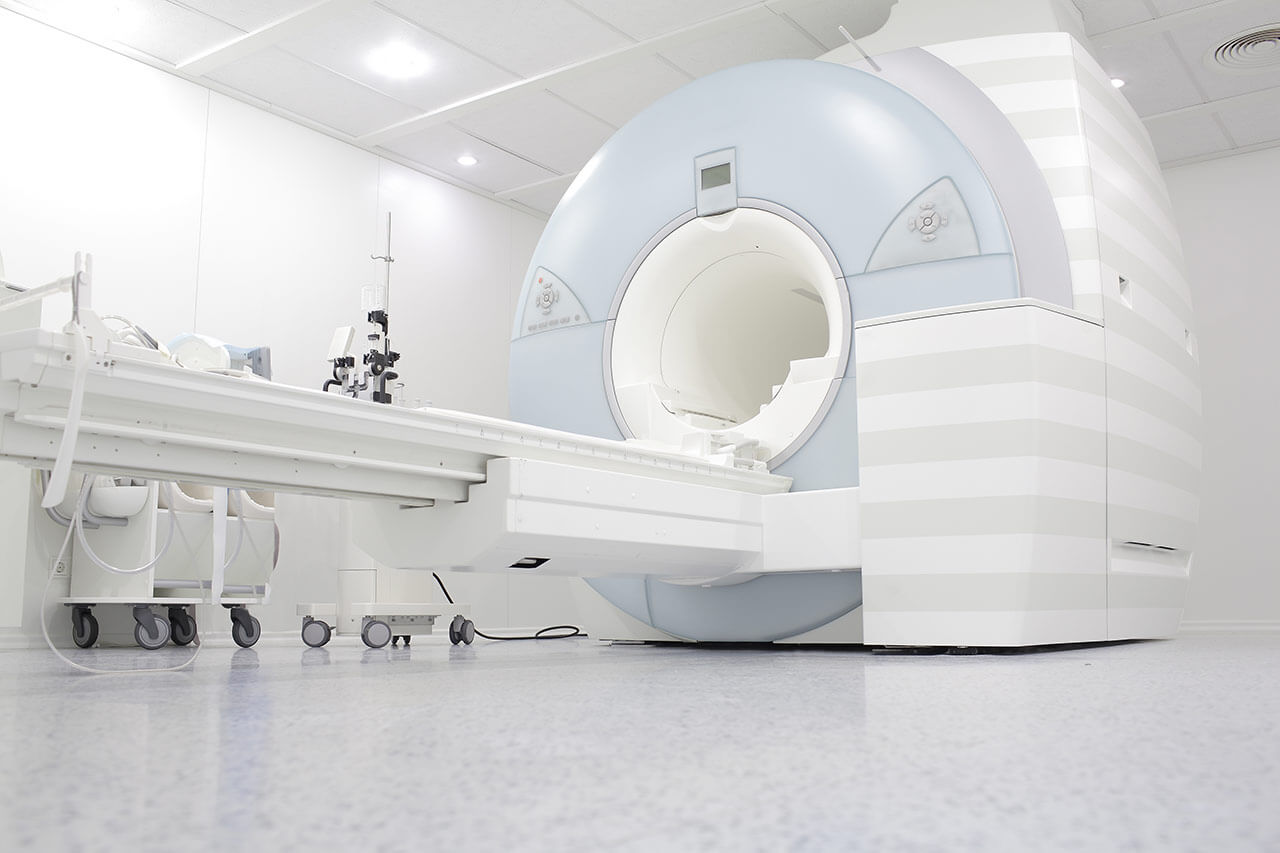
The program includes:
- Initial presentation in the clinic
- clinical history taking
- physical examination
- review of medical records
- laboratory tests:
- complete blood count
- general urine analysis
- biochemical blood analysis
- tumor markers
- indicators of inflammation
- indicators of blood coagulation
- CT/MRI
- ultrasound/ X-ray examination
- conduct endo-sonography of bronchi
- bronchoscopy with biopsy of bronchi and lungs
- histological/ cytological research
- nursing services
- consultation of related specialists
- consultation of the chief physician and all leading experts
- development of individual treatment plan
Required documents
- Medical records
- MRI/CT scan (not older than 3 months)
- Biopsy results (if available)
Service
You may also book:
 BookingHealth Price from:
BookingHealth Price from:
About the department
The Department of Pediatric Pulmonology, Allergology and Rheumatology at the Hannover Medical School offers comprehensive diagnostics and effective treatment of acute and chronic diseases of the lungs and respiratory tract, allergic reactions and rheumatic diseases. With the Department of Gynecology and Obstetrics, the department forms the Level I Perinatal Center, and therefore young patients of all age groups, including newborns and premature babies, can receive high-quality medical care here. The department's medical team specializes in conservative treatment, and if surgery is required, pediatric surgeons are involved in the process. In addition to specialized doctors, the department employs an experienced team of nursing staff, psychologists, nutritionists, physiotherapists and other specialists whose task is to restore the child's health. The doctors devote enough time to communication with children and their parents, and also do everything possible to make the child feel as comfortable as possible in the hospital. The Chief Physician of the department is Prof. Dr. med. Gesine Hansen.
One of the main focuses of the department's clinical activities is the provision of medical care to children with diseases of the lungs and respiratory tract. Depending on the particular clinical case, children with pathologies of this spectrum can receive treatment both on an inpatient or outpatient basis. The department has well-equipped diagnostic rooms, which allow pediatric pulmonologists to assess the condition of the child's lungs and respiratory tract. The department's diagnostic options include whole-body plethysmography, spirometry, impulse oscillometry, lung diffusion testing, treadmill exercise stress tests, laryngoscopy, provocation tests, and other diagnostic methods. With diagnostic results, the attending physician makes a diagnosis and begins to develop an optimal treatment regimen. The department carries out only conservative therapy, which consists in the intake of drugs. If drug therapy does not yield the desired result, it becomes necessary to use more radical therapeutic measures. Pulmonologusts plan endoscopic or surgical treatment in collaboration with pediatric surgeons, thoracic surgeons, radiologists and other specialists. Pediatric pulmonologists most often admit young patients with severe forms of bronchial asthma, congenital malformations of the lungs and respiratory tract, interstitial lung diseases, infectious respiratory diseases, etc.
The department includes a specialized Pediatric Cystic Fibrosis Center, which began its work in 1972 and today is known as one of the best specialized centers in Germany. Moreover, as of today, it is the only medical facility in the country where young patients can receive the full range of diagnostic and therapeutic procedures – from genetic tests, sweat tests and electrophysiological tests to lung transplant. The doctors of the center annually treat about 2,000 children under the age of 18, who suffer from cystic fibrosis and similar severe lung diseases.
An integral part of the work of the medical facility is the diagnostics and treatment of allergies in children. Pediatric allergists specialize in the treatment of bronchial asthma, allergic rhinitis, food allergies, atopic eczema, insect venom allergies, and drug allergies. Allergies are detected using skin tests, IgE tests, nasal provocation tests, and special provocation tests to determine food intolerances. The main treatment method for allergy is allergen-specific immunotherapy (hyposensitization, ASIT). In most cases, children with allergies receive medical care on an outpatient basis. Hospitalization may be required if the child develops wasp or bee venom allergy.
The department also employs a competent team of pediatric rheumatologists, who annually admit more than 1,400 children with pathologies of this spectrum. The department belongs to the largest medical facilities in Germany specializing in rheumatic diseases in children. The department's interdisciplinary team, consisting of pediatric rheumatologists, nurses, physiotherapists, psychologists and social teachers, carries out diagnostics and treatment of all rheumatic diseases in children under the age of 18. The most common clinical conditions include all forms of juvenile rheumatoid arthritis, including systemic arthritis, enthesitis-related arthritis, psoriatic arthritis, and all forms of scleroderma. The diagnostic options include standardized assessment of joint status and muscle examination (assessment of myositis in children, manual muscle testing), as well as imaging diagnostics (ultrasound, MRI, etc.). In addition to drug therapy, the department carries out joint punctures, steroid injections, as well as splints and individual selection of other aids.
The department's range of medical services includes:
- Diagnostics and treatment of pulmonary diseases
- Bronchial asthma
- Chronic obstructive pulmonary disease
- Acute and chronic infectious diseases of the lungs
- Pulmonary tuberculosis
- Interstitial lung diseases (ILD)
- Primary ciliary dyskinesia (PCD)
- Bronchopulmonary dysplasia
- Congenital pathologies of the respiratory tract
- Extrinsic allergic alveolitis
- Allergic bronchopulmonary aspergillosis
- Bronchiectasis
- Malformations and diseases of the pulmonary vessels
- Alpha-1-antitrypsin deficiency (including cystic fibrosis)
- Breathing dysregulation
- Systemic diseases involving the respiratory tract
- Diagnostics and treatment of allergic diseases
- Bronchial asthma
- Allergic rhinitis
- Food allergies
- Atopic eczema
- Insect venom allergy
- Drug allergy
- Diagnostics and treatment of rheumatic diseases
- All forms of juvenile arthritis
- Oligoarthritis
- Seronegative and seropositive polyarthritis
- Still's disease
- Enthesitis-related arthritis
- Psoriatic arthritis
- Collagenoses
- Systemic lupus erythematosus
- Juvenile dermatomyositis
- All forms of scleroderma
- Sclerodermia placata
- Linear scleroderma
- Systemic scleroderma
- Vasculitis (Kawasaki disease, Henoch-Schonlein purpura and others)
- Periodic fever syndromes (familial Mediterranean fever, TRAPS, and others)
- Chronic nonbacterial osteomyelitis
- All forms of juvenile arthritis
- Other diagnostic and therapeutic options
Curriculum vitae
Higher Education and Postgraduate Training
- 1985 - 1992 Study of Human Medicine at Ruhr University Bochum, Charing Cross Hospital Medical School and Westminster Hospital Medical School.
- 1992 Doctoral thesis defence, Institute of Microbiology and Virology, Ruhr University Bochum.
- 2001 Habilitation and Venia Legendi in Pediatric and Adolescent Medicine, Martin Luther University Halle-Wittenberg.
Professional Career
- 2001 - 2006 Head of the Research Group of the German Federal Ministry of Education and Research: "Search for immunoregulatory mechanisms of development of allergic bronchial asthma and the development of new therapeutic regimens".
- 2003 - 2005 C3 Professor in Pediatric Allergology and Pulmonology, Martin Luther University Halle-Wittenberg.
- Since 2005 W3 Professor in Pediatric and Adolescent Medicine and Head of the Department of Pediatric Pulmonology, Allergology and Rheumatology at the Hannover Medical School.
- 2009 - 2013 SFB 587 Representative, Immune Reactions in the Lungs in Infections and Allergies, German Research Foundation (DFG).
- Since 2013 Board Member of the German Center for Lung Research, BREATH, German Federal Ministry for Education and Research (BMBF).
- Since 2018 Representative of the Else Kroener Research College of Young Doctors (TITUS – The First Thousand Days of Life – Frühe Prägung und Prävention).
- Since 2018 Deputy Press Secretary, Working Group of the German Research Foundation (DFG).
Awards, Prizes and Honors
- 2000 International Young Researchers Prize "Pediatric Pulmonology", Munich.
- 2001 Johannes Wenner Prize of the Pediatric Pulmonology Association, Bern.
- 2001 Arthur Schlossmann Prize, Society of Pediatric and Adolescent Medicine, Germany.
- 2002 Wilhelm Roux Research Prize, Martin Luther University Halle-Wittenberg.
- 2002 Adalbert Czerny Prize of the German Society of Pediatric and Adolescent Medicine, Leipzig.
- 2003 International Allergy Research Award, Vancouver, Canada.
- 2007 Karl Hansen Prize, German Society of Allergology and Clinical Immunology, Luebeck.
- 2013 Eva Luise and Horst Koehler Prize for Research on Rare Diseases, Berlin.
- 2013 Admission to the German National Academy of Sciences Leopoldina.
Research Interests
- Immune regulation in allergies and bronchial asthma.
- Paediatric respiratory infections.
- Cell therapy for rare lung diseases.
Patents
- PCT/EP2009/067384: diagnostic conjugate and polychromatic analysis method.
- EP17195522.2: diagnostics and therapy for human respiratory syncytial virus (hRSV).
Work in Professional Organizations and Societies
- Since 2006 Member of the Commission for Medicines for Children and Adolescents (KAKJ) of the Federal Ministry of Health.
- 2004 - 2008 Board Member of the German Society for Pediatric Pulmonology (GPP).
- 2008 - 2013 Advisory Board Member of the Genomic Medicine and Research Program of the German Federal Ministry of Education and Research (BMBF).
- 2008 - 2015 President of the German Society for Pediatric Pulmonology (GPP).
- 2008 - 2015 Board Member of the Society of Pediatric Allergology.
- 2016 - 2024 Member of the Medical Commission of the German Research Foundation.
- 2020 - 2024 Member of the Professorial Admission Committee of Humboldt University Berlin.
Photo of the doctor: (c) Medizinische Hochschule Hannover (MHH)
About hospital
The Hannover Medical School has the status of a leading German medical facility. The advanced medical technologies, highly qualified specialists, as well as productive research activities form a solid basis for top-class medical service of the world standard. The hospital is proud of its outstanding achievements in the treatment of cancer, diseases of the lung, heart, kidney, liver and metabolic disorders, as well as surgical diseases.
The medical facility diagnoses and treats more than 63,000 inpatients and about 470,000 outpatients annally. These indicators are growing steadily, which indicates the reputability and prestige of the hospital in the European medical arena.
For decades, the hospital has been a pioneer in transplantation medicine and is one of the leading centers of this specialization in the world. It performs about 400 transplantations of solid organs annually. Also, the hospital has performed over 130 bone marrow transplantations. In addition, the hospital ranks among the world leaders in cochlear implantation for the treatment of hearing loss.
Much attention is paid to interdisciplinary cooperation. Since 2016, the hospital has the largest certified Cancer Center in the Federal State of Lower Saxony, which provides comprehensive, multidisciplinary medical care in accordance with the standardized protocols of cancer societies.
The specialists of the hospital offer patients not only modern treatment of the highest quality, but also attentive care, sympathetic attitude to the patient's problems and understanding of his individual needs. Thus, the patient can be sure that his health is in the safe hands of highly qualified doctors.
Photo: (c) depositphotos
Accommodation in hospital
Patients rooms
The patients of the Hannover Medical School live in comfortable and cozy rooms. Each patent room has an ensuite bathroom with shower and toilet. A standard patient room includes an automatically adjustable bed with an orthopedic mattress, a bedside table, a wardrobe, a TV and a telephone. You can use TV, telephone and Internet using a special chip card, which can be purchased at self-service terminals or ordered at the service counter. The hospital allows the patients to use mobile phones, with the exception of intensive care units, some departments and diagnostic rooms.
If desired, the patient can stay in an enhanced-comfort room. Such rooms are distinguished by a more sophisticated design, and are additionally equipped with upholstered furniture, a safe for storing valuables and a mini fridge.
Meals and Menus
The patient and the accompanying person are offered delicious and balanced three meals a day. Breakfast and dinner are served buffet style and lunch can be chosen from three set menus. All dishes are prepared by professional chefs using the freshest ingredients available in the region.
If you are on a specific diet for some reason, you will be offered an individual menu. Please inform the medical staff about your dietary preferences prior to the treatment.
Further details
Standard rooms include:
Religion
There is a chapel on the territory of the hospital, where Christian and Catholic services are regularly held. The hospital provides a prayer room for followers of Islam, which is open for visits 24 hours a day.
Religious services can also be provided upon request.
Accompanying person
During an inpatient program, an accompanying person can stay with you in the patient room or in a hotel of your choice.
Hotel
During an outpatient program, you can stay in a hotel of your choice. The managers will help you choose the most suitable options.




